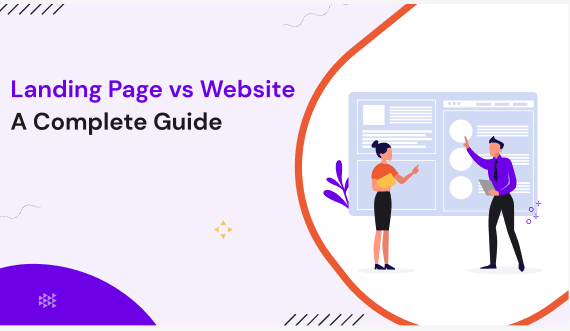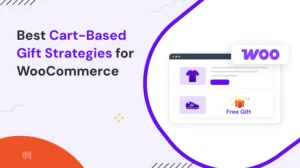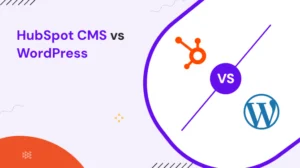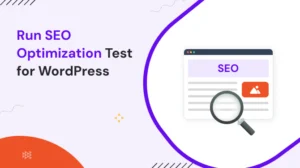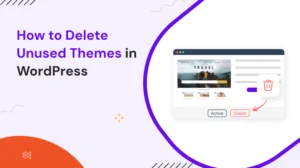Table of Contents
Landing pages vs websites is the topic that is often discussed when trying to decide how to showcase your business online.
So, if I explain it quickly,
A landing page is like a handshake. And a website is like a conversation over coffee. Both matter. But when to use what really matters.
To solve this problem, here I break down when you should use one over the other and how they work together to achieve your online goals faster and more effectively.
What is a Landing Page?
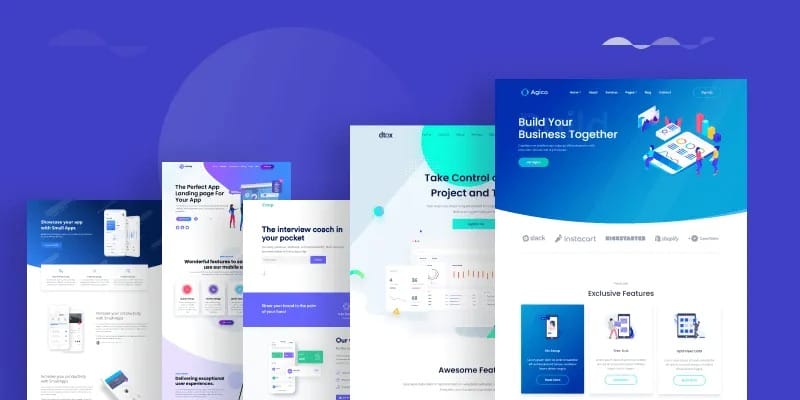
A landing page is a single, standalone page with one specific goal that is usually tied to a campaign. It could be to:
- Drive clicks to a sales page
- Get signups for a webinar
- Collect email addresses for a freebie
- Promote a limited-time product offer
Key Features of a Landing Page
- Focused Goal: Every element on a landing page is designed to guide the visitor toward a specific conversion action.
- Minimal Design: Landing pages typically have no distracting elements. There are no navigation bars, no links to other parts of the website, and often only a single CTA (Call-to-Action) button.
- Targeted Messaging: Landing pages are tailored to the target audience you’re focusing on for a particular campaign. This allows for highly customized messaging that resonates with your audience’s specific needs and interests.
- Optimized for Conversion: Every design element, from the headline to the CTA button, is strategically crafted to encourage conversion. Conversion optimization techniques such as A/B testing, user-centric design, and trust signals (like testimonials and security badges) are often incorporated.
What is a Website?
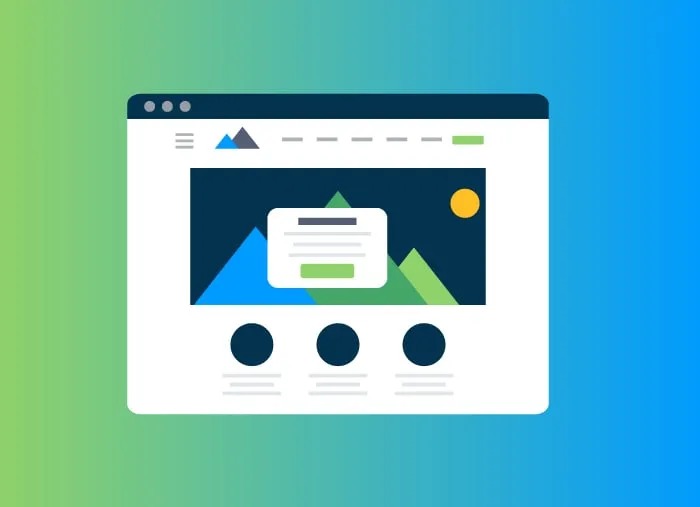
A website is a collection of interlinked pages, such as your homepage, about page, contact page, blog, services, etc. It’s your online storefront, open 24/7. It tells your story, builds credibility, and lets visitors explore.
Key Features of a Website
- Multiple Pages: Websites include various sections such as a home page, about page, product or service pages, blog, contact page, and more.
- Navigation Options: Websites are designed with a navigation bar, allowing users to explore different sections of the site and learn more about what the business has to offer.
- Long-Term Engagement: Websites are often used to engage users over time, offering in-depth information, fostering trust, and building brand loyalty.
- SEO-Friendly: Websites are often optimized to rank in search engines over time, with ongoing content updates, SEO practices, and efforts to increase organic traffic.
Landing Page vs Website: Key Differences at a Glance
| Feature | Website | Landing Page |
| Structure | Multi-page | Single-page |
| Purpose | Brand building, information, and services | Focused conversion (1 goal) |
| Navigation | Menu, links | Usually, no menu or links |
| Content Depth | Broad (Blogs, Pages, Team, FAQs) | Narrow (Concise, Action-driven) |
| Ideal For | Businesses, portfolios, blogs | Ads, campaigns, lead magnets |
When to Use a Website?
If you’re building a brand, showcasing multiple offers, or want visitors to explore, a website is your foundation.
Use a Website When You:
- Want long-term visibility
- Need to share multiple services
- Publish regular content (like blogs)
- Want to rank on Google (SEO)
- Expect people to browse and learn
When to Use a Landing Page?
Landing pages shine when you want focus, urgency, and action.
Use a Landing Page When You:
- Run Facebook/Google ads
- Launch a product or event
- Offer a free ebook or lead magnet
- Collect RSVPs or email subscribers
- Need a temporary campaign page
Pros and Cons of Landing Page And Website
| Type | Pros | Cons |
| Website | 🔹Builds credibility & trust 🔹Better for SEO 🔹Let users explore at their own pace | 🔹Can overwhelm visitors 🔹Takes longer to build & manage 🔹Unclear conversion paths |
| Landing Page | 🔹High conversion potential 🔹Focused messaging 🔹Easier to test | 🔹Limited information 🔹Not ideal for SEO 🔹Works best with paid traffic |
Do You Need Both?
Yes, you need it, but first, start with what you need most.
If you’re launching a new product or building an email list, start with a landing page. Later, you can build a full site to support your long-term growth.
How to Decide Which Is Better For My Business?
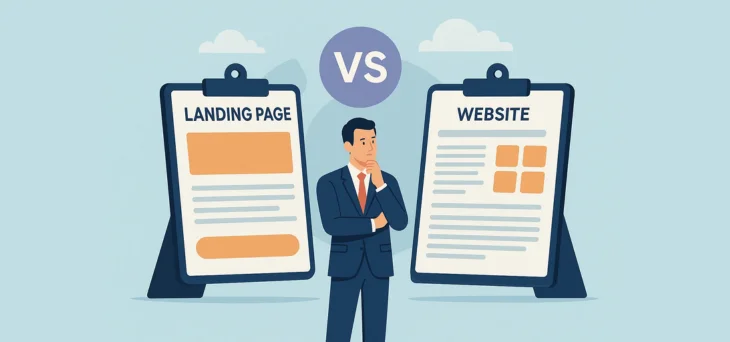
The answer is simple.
If you want visitors to learn about your brand and browse multiple pages, then build a website. But if you want them to take one specific action quickly, like sign up, buy, register, then build a landing page.
But I highly recommend creating landing pages within a website because it combines the depth of a site with the clarity of a page.
Which Is Better for SEO?
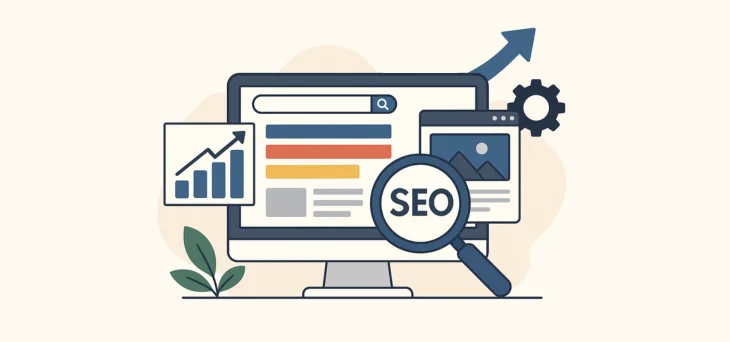
There’s a clear winner here: Websites.
Search engines like content-rich, well-structured websites with internal links and regular updates.
And by nature, landing pages are usually isolated and not designed for search traffic. That’s why they’re paired with ads or email marketing.
How To Optimize Landing Pages and Websites for SEO?
SEO strategies for landing pages and websites differ significantly due to the unique purposes of each.
Landing Page SEO Optimization:
- Target Specific Keywords: Focus on long-tail keywords that are highly relevant to your campaign. For example, you might target phrases like “Landing page conversion rates vs website” or “PPC landing page vs website”.
- Minimal Distractions: Keep your landing page clean and focused on one action. Avoid unnecessary elements like navigation menus, extra links, or additional CTAs.
- Compelling Content: Write engaging content that quickly communicates the value of your offer. Use trust signals like testimonials or reviews to further encourage conversion.
Website SEO Optimization:
- Broader Keyword Strategy: For websites, a broader keyword strategy is needed. Optimize different pages for different keywords, ensuring that your content targets both short-tail and long-tail keywords.
- Internal Linking: Make use of internal links to guide users through your website. This not only improves user experience but also helps search engines understand the structure of your site.
Content Creation: Regularly update your website with fresh content, such as blog posts, articles, and case studies, to keep it relevant and attractive to both users and search engines.
Final Thoughts
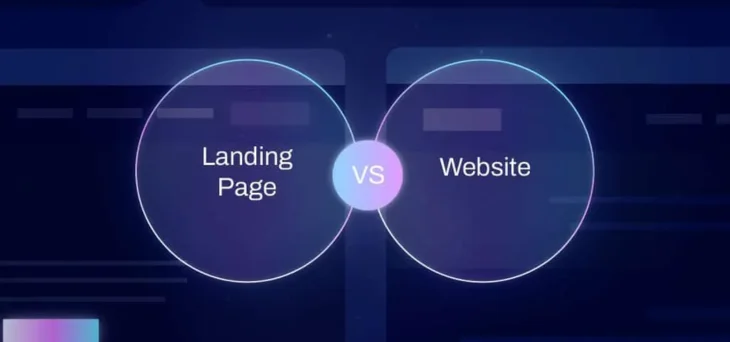
Now that you understand the difference between a landing page and a website, you’re no longer guessing. You’re choosing. Strategically.
- If you’re just starting out and want to validate an idea, choose a landing page.
- If you’re building a long-term brand or business, build a website.
- But if you want to grow exponentially, then build both and integrate smartly.
Remember one thing. What matters most is not the choice itself, but how clearly it delivers your message and aligns with your goal.
FAQs: Landing Page vs Website
Can I use a landing page without having a website?
Yes, you can use it. Many businesses launch campaigns using just a landing page. It’s perfect when you want to test an idea, capture leads, or run ads without building a full website.
Can a website have landing pages inside it?
Yes, and that’s often the best strategy. Embedding landing pages within a website allows you to drive focused conversions and provide brand depth, SEO value, and additional information for curious visitors.
Which one is faster to create, a landing page or a website?
A landing page, by far. With a single objective, limited content, and no complex navigation, landing pages can be built in hours, sometimes minutes.
Do landing pages rank on Google?
Rarely can it rank. Landing pages aren’t built for SEO. They’re designed for conversions and often used with paid traffic. If ranking on Google matters to you, you’ll need a content-rich website.
Is a landing page better for lead generation?
Yes, that’s its goal. Landing pages are laser-focused on one action that making them more effective for lead generation than a multi-page website.
Do I need both a website and landing pages for my business?
Yes, because it’s worth it. But start with what aligns best with your current goal. If you’re running a campaign, launch a landing page. As you grow, build a full website for long-term branding and SEO benefits.
How many landing pages should I create?
There’s no fixed number. But as a general rule, create a separate landing page for each campaign, audience segment, or offer. The more specific your page, the better it will perform.
Can landing pages be used for eCommerce?
Yes, particularly for product launches, flash sales, or seasonal promotions. However, for a full eCommerce experience with browsing, filters, and checkout, a website is essential.
What tools can I use to build landing pages and websites?
There are so many options. For websites, WordPress, Wix, and Webflow are popular choices. For landing pages, Leadpages, Unbounce, or even WordPress page builders like Elementor work well.
Other Comparison Blogs:
